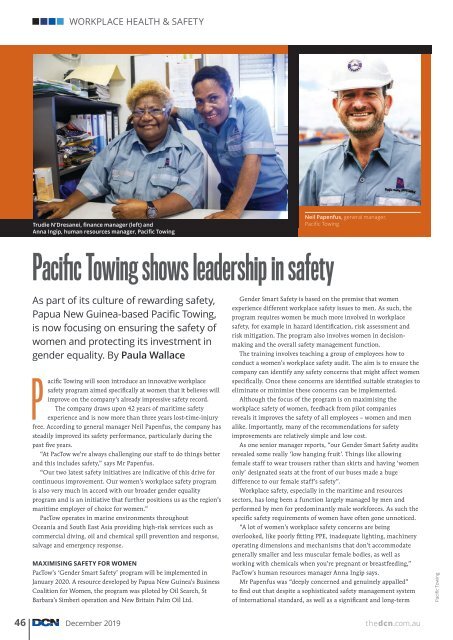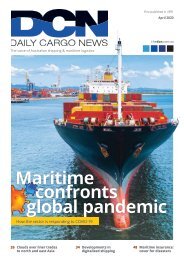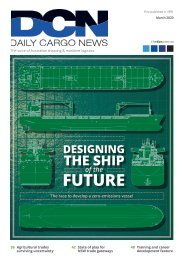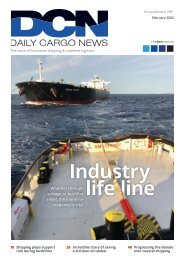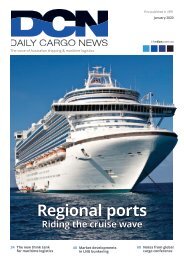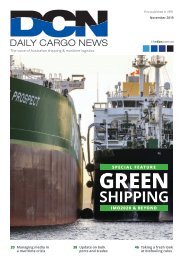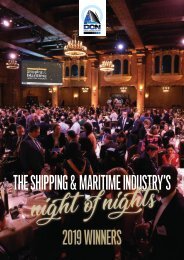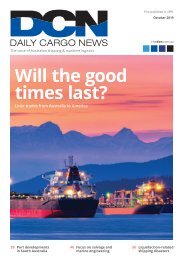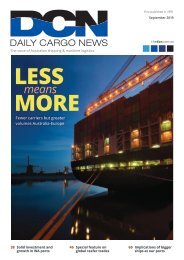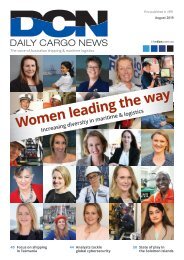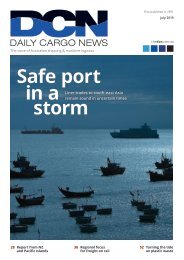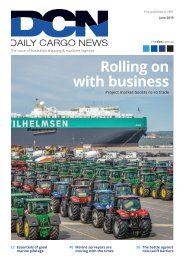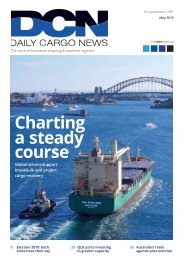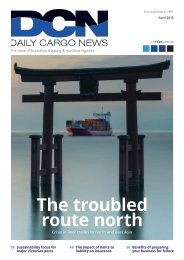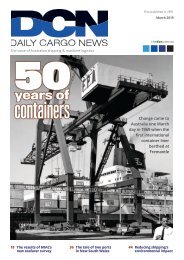DCN December Edition 2019
You also want an ePaper? Increase the reach of your titles
YUMPU automatically turns print PDFs into web optimized ePapers that Google loves.
WORKPLACE HEALTH & SAFETY<br />
Trudie N’Dresanei, finance manager (left) and<br />
Anna Ingip, human resources manager, Pacific Towing<br />
Neil Papenfus, general manager,<br />
Pacific Towing<br />
Pacific Towing shows leadership in safety<br />
As part of its culture of rewarding safety,<br />
Papua New Guinea-based Pacific Towing,<br />
is now focusing on ensuring the safety of<br />
women and protecting its investment in<br />
gender equality. By Paula Wallace<br />
Pacific Towing will soon introduce an innovative workplace<br />
safety program aimed specifically at women that it believes will<br />
improve on the company’s already impressive safety record.<br />
The company draws upon 42 years of maritime safety<br />
experience and is now more than three years lost-time-injury<br />
free. According to general manager Neil Papenfus, the company has<br />
steadily improved its safety performance, particularly during the<br />
past five years.<br />
“At PacTow we’re always challenging our staff to do things better<br />
and this includes safety,” says Mr Papenfus.<br />
“Our two latest safety initiatives are indicative of this drive for<br />
continuous improvement. Our women’s workplace safety program<br />
is also very much in accord with our broader gender equality<br />
program and is an initiative that further positions us as the region’s<br />
maritime employer of choice for women.”<br />
PacTow operates in marine environments throughout<br />
Oceania and South East Asia providing high-risk services such as<br />
commercial diving, oil and chemical spill prevention and response,<br />
salvage and emergency response.<br />
MAXIMISING SAFETY FOR WOMEN<br />
PacTow’s ‘Gender Smart Safety’ program will be implemented in<br />
January 2020. A resource developed by Papua New Guinea’s Business<br />
Coalition for Women, the program was piloted by Oil Search, St<br />
Barbara’s Simberi operation and New Britain Palm Oil Ltd.<br />
Gender Smart Safety is based on the premise that women<br />
experience different workplace safety issues to men. As such, the<br />
program requires women be much more involved in workplace<br />
safety, for example in hazard identification, risk assessment and<br />
risk mitigation. The program also involves women in decisionmaking<br />
and the overall safety management function.<br />
The training involves teaching a group of employees how to<br />
conduct a women’s workplace safety audit. The aim is to ensure the<br />
company can identify any safety concerns that might affect women<br />
specifically. Once these concerns are identified suitable strategies to<br />
eliminate or minimise these concerns can be implemented.<br />
Although the focus of the program is on maximising the<br />
workplace safety of women, feedback from pilot companies<br />
reveals it improves the safety of all employees – women and men<br />
alike. Importantly, many of the recommendations for safety<br />
improvements are relatively simple and low cost.<br />
As one senior manager reports, “our Gender Smart Safety audits<br />
revealed some really ‘low hanging fruit’. Things like allowing<br />
female staff to wear trousers rather than skirts and having ‘women<br />
only’ designated seats at the front of our buses made a huge<br />
difference to our female staff’s safety”.<br />
Workplace safety, especially in the maritime and resources<br />
sectors, has long been a function largely managed by men and<br />
performed by men for predominantly male workforces. As such the<br />
specific safety requirements of women have often gone unnoticed.<br />
“A lot of women’s workplace safety concerns are being<br />
overlooked, like poorly fitting PPE, inadequate lighting, machinery<br />
operating dimensions and mechanisms that don’t accommodate<br />
generally smaller and less muscular female bodies, as well as<br />
working with chemicals when you’re pregnant or breastfeeding,”<br />
PacTow’s human resources manager Anna Ingip says.<br />
Mr Papenfus was “deeply concerned and genuinely appalled”<br />
to find out that despite a sophisticated safety management system<br />
of international standard, as well as a significant and long-term<br />
Pacific Towing<br />
46 <strong>December</strong> <strong>2019</strong><br />
thedcn.com.au


